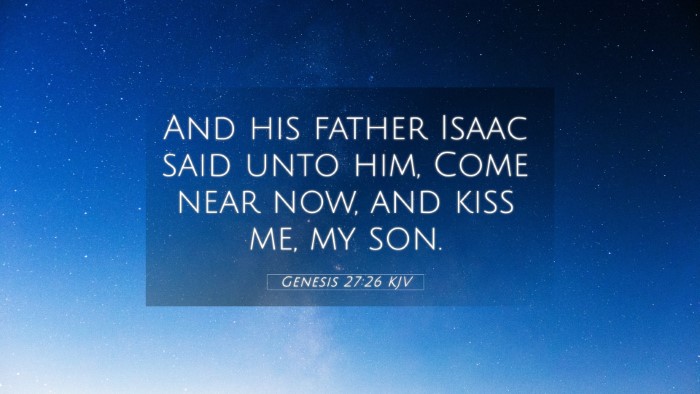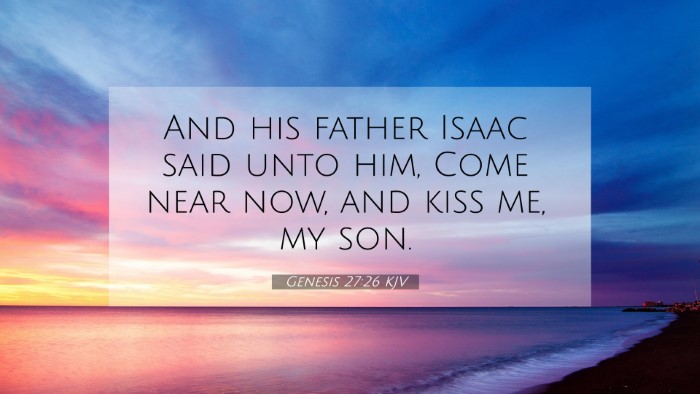Understanding Genesis 27:26
Genesis 27:26 states:
"And his father Isaac said unto him, Come near now, and kiss me, my son."
Summary of the Verse
This verse captures a pivotal moment in the story of Isaac and his sons, Esau and Jacob. Isaac, who is old and nearly blind, calls upon his son to embrace him. This reflects the familial bonds and the intricacies of the blessing that is about to unfold.
Commentary Insights
Matthew Henry's Commentary
Matthew Henry explains that Isaac’s call to Jacob to draw near is laden with emotion. The act of kissing signifies a blessing and an intimate connection. Isaac’s desire for closeness suggests not only affection but also the weight of the impending blessing which Jacob is about to receive under deceitful circumstances.
Albert Barnes' Notes on the Bible
Albert Barnes elaborates on the cultural context of the verse. In Hebrew tradition, blessings were physically and spiritually significant, often accompanied by rituals that underscored the transference of paternal authority. Isaac’s summons of his son illustrates the seriousness of the blessing that is associated with identity and legacy.
Adam Clarke's Commentary
Adam Clarke provides insights into the familial dynamics at play. He notes that the act of kissing signifies trust and sincerity, especially given the deception that permeates the story. Clarke emphasizes that this moment illustrates the complexity of divine purpose amidst human actions, revealing that God can work through flawed circumstances.
Cross-Referencing Related Bible Verses
Here are several cross-references that link to Genesis 27:26, which can enhance understanding through comparative study:
- Genesis 27:5-10: The deception by Rebecca and Jacob; the groundwork for the upcoming blessing.
- Genesis 27:21: Isaac's uncertainty about Jacob's identity highlights the thematic tension of trust and deception.
- Genesis 27:38: Esau's grief upon realizing Jacob has taken his blessing reinforces emotional stakes in familial relationships.
- Hebrews 11:20: The New Testament reference to the faith aspect of Isaac’s blessing, portraying his acknowledgment of God’s sovereign plan.
- Romans 9:10-13: Paul discusses the divine choice associated with Jacob and Esau, showing the wider implications of their story in salvation history.
- Genesis 28:1-4: The subsequent blessings and promises bestowed upon Jacob, demonstrating continuity in the covenant lineage.
- Malachi 1:2-3: A prophetic mention of Jacob and Esau that echoes their legacy and God's favor towards Jacob.
Connections and Interpretations
The verse signifies more than just a familial moment; it paves the way for understanding complex biblical themes:
- Divine Sovereignty: The event illustrates God's control over human choices and outcomes.
- The Nature of Blessing: An examination of what it means to receive a blessing and its implications for identity.
- Familial Dynamics: The exploration of brotherhood reveals tensions that culminate in larger biblical narratives.
Thematic Bible Verse Connections
Genesis 27:26 opens the door to broader themes within Scripture:
- Exploration of identity and legacy in God’s redemptive plan.
- The motif of deception and how it plays out across different biblical texts.
- Understanding father-son relationships throughout the Bible.
Conclusion
Genesis 27:26 invites readers to reflect on the nature of blessings, familial relationships, and the overarching purpose of God in the narratives of the Bible. The insights from public domain commentaries provide rich layers of interpretation that enhance our understanding of this verse and its implications.


